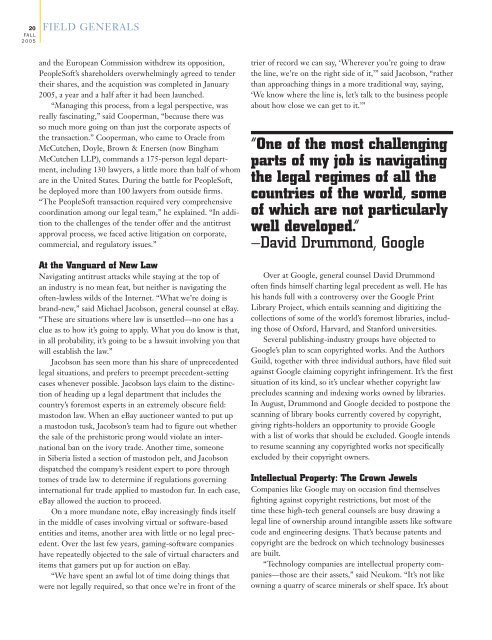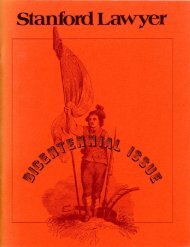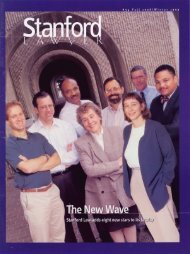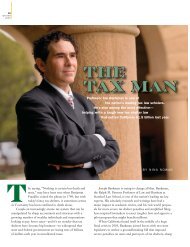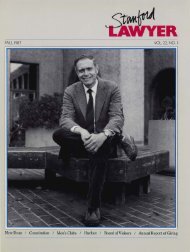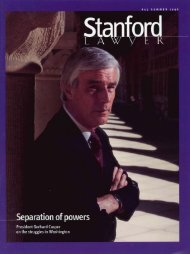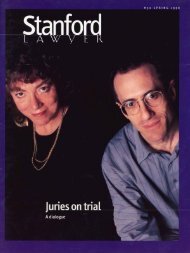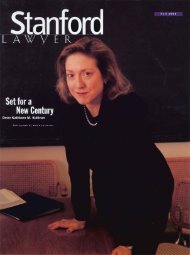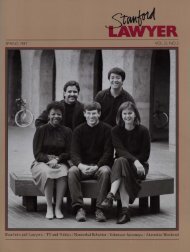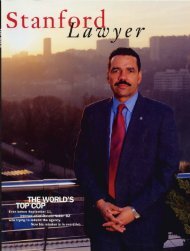Issue 73 - Stanford Lawyer - Stanford University
Issue 73 - Stanford Lawyer - Stanford University
Issue 73 - Stanford Lawyer - Stanford University
Create successful ePaper yourself
Turn your PDF publications into a flip-book with our unique Google optimized e-Paper software.
20<br />
FALL<br />
2005<br />
FIELD GENERALS<br />
and the European Commission withdrew its opposition,<br />
PeopleSoft’s shareholders overwhelmingly agreed to tender<br />
their shares, and the acquistion was completed in January<br />
2005, a year and a half after it had been launched.<br />
“Managing this process, from a legal perspective, was<br />
really fascinating,” said Cooperman, “because there was<br />
so much more going on than just the corporate aspects of<br />
the transaction.” Cooperman, who came to Oracle from<br />
McCutchen, Doyle, Brown & Enersen (now Bingham<br />
McCutchen LLP), commands a 175-person legal department,<br />
including 130 lawyers, a little more than half of whom<br />
are in the United States. During the battle for PeopleSoft,<br />
he deployed more than 100 lawyers from outside firms.<br />
“The PeopleSoft transaction required very comprehensive<br />
coordination among our legal team,” he explained. “In addition<br />
to the challenges of the tender offer and the antitrust<br />
approval process, we faced active litigation on corporate,<br />
commercial, and regulatory issues.”<br />
At the Vanguard of New Law<br />
Navigating antitrust attacks while staying at the top of<br />
an industry is no mean feat, but neither is navigating the<br />
often-lawless wilds of the Internet. “What we’re doing is<br />
brand-new,” said Michael Jacobson, general counsel at eBay.<br />
“These are situations where law is unsettled—no one has a<br />
clue as to how it’s going to apply. What you do know is that,<br />
in all probability, it’s going to be a lawsuit involving you that<br />
will establish the law.”<br />
Jacobson has seen more than his share of unprecedented<br />
legal situations, and prefers to preempt precedent-setting<br />
cases whenever possible. Jacobson lays claim to the distinction<br />
of heading up a legal department that includes the<br />
country’s foremost experts in an extremely obscure field:<br />
mastodon law. When an eBay auctioneer wanted to put up<br />
a mastodon tusk, Jacobson’s team had to figure out whether<br />
the sale of the prehistoric prong would violate an international<br />
ban on the ivory trade. Another time, someone<br />
in Siberia listed a section of mastodon pelt, and Jacobson<br />
dispatched the company’s resident expert to pore through<br />
tomes of trade law to determine if regulations governing<br />
international fur trade applied to mastodon fur. In each case,<br />
eBay allowed the auction to proceed.<br />
On a more mundane note, eBay increasingly finds itself<br />
in the middle of cases involving virtual or software-based<br />
entities and items, another area with little or no legal precedent.<br />
Over the last few years, gaming-software companies<br />
have repeatedly objected to the sale of virtual characters and<br />
items that gamers put up for auction on eBay.<br />
“We have spent an awful lot of time doing things that<br />
were not legally required, so that once we’re in front of the<br />
trier of record we can say, ‘Wherever you’re going to draw<br />
the line, we’re on the right side of it,’” said Jacobson, “rather<br />
than approaching things in a more traditional way, saying,<br />
‘We know where the line is, let’s talk to the business people<br />
about how close we can get to it.’”<br />
“One of the most challenging<br />
parts of my job is navigating<br />
the legal regimes of all the<br />
countries of the world, some<br />
of which are not particularly<br />
well developed.”<br />
—David Drummond, Google<br />
Over at Google, general counsel David Drummond<br />
often finds himself charting legal precedent as well. He has<br />
his hands full with a controversy over the Google Print<br />
Library Project, which entails scanning and digitizing the<br />
collections of some of the world’s foremost libraries, including<br />
those of Oxford, Harvard, and <strong>Stanford</strong> universities.<br />
Several publishing-industry groups have objected to<br />
Google’s plan to scan copyrighted works. And the Authors<br />
Guild, together with three individual authors, have filed suit<br />
against Google claiming copyright infringement. It’s the first<br />
situation of its kind, so it’s unclear whether copyright law<br />
precludes scanning and indexing works owned by libraries.<br />
In August, Drummond and Google decided to postpone the<br />
scanning of library books currently covered by copyright,<br />
giving rights-holders an opportunity to provide Google<br />
with a list of works that should be excluded. Google intends<br />
to resume scanning any copyrighted works not specifically<br />
excluded by their copyright owners.<br />
Intellectual Property: The Crown Jewels<br />
Companies like Google may on occasion find themselves<br />
fighting against copyright restrictions, but most of the<br />
time these high-tech general counsels are busy drawing a<br />
legal line of ownership around intangible assets like software<br />
code and engineering designs. That’s because patents and<br />
copyright are the bedrock on which technology businesses<br />
are built.<br />
“Technology companies are intellectual property companies—those<br />
are their assets,” said Neukom. “It’s not like<br />
owning a quarry of scarce minerals or shelf space. It’s about


